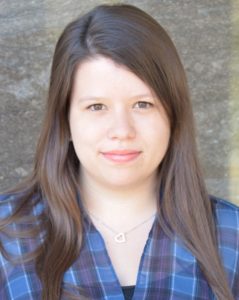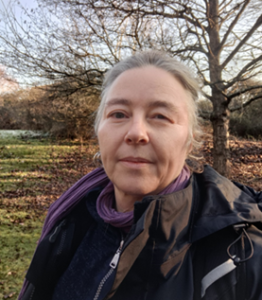To further thank and recognise the support from our excellent reviewer community, we are highlighting reviewers who have provided exceptional support to the journal over the past year.
This month, we’ll be highlighting Laura Hernandez, Klaus Braagaard Møller, Claudia Blindauer and Ranjan Jana. We asked our reviewers a few questions about what they enjoy about reviewing, and their thoughts on how to provide a useful review.

Laura Hernandez, McGill University. Laura’s research focuses on finding and characterizing micro and nanoplastics in the environment and consumer products that directly impact humans. Due to their chemical composition and size, micro and nanoplastics are not like regular nanoparticles, thus the challenge.

Klaus Braagaard Møller, Technical University of Denmark. Klaus uses theory and computational chemistry to unravel the course of the most basic processes in chemistry (chemical dynamics) and their signatures in ultrafast experiments, with a particular focus on vibronic and solvation dynamics.

Claudia Blindauer, University of Warwick. Claudia is an inorganic and analytical biochemist interested in how metal ions, in particular zinc, move around in organisms and cells, with a focus on proteins that are involved in these processes.

Ranjan Jana, CSIR-Indian Institute of Chemical Biology. Ranjan’s research involves exploring divergent, cascade C–H activation for medicinal chemistry and drug discovery, and circular CO2 economy in organic synthesis.
What encouraged you to review for Chemical Science?
Claudia Blindauer: I am a member of the RSC, and I am publishing in and reviewing for a range of RSC journals – amongst many others. Often, I am personally known to the academic editors, which helps with invitations to review being well-targeted and manuscripts being within my area of expertise. Obviously, it is an honour to also review for the RSC’s flagship journal, and I have also published some of our best work in Chemical Science.
Klaus Braagaard Møller: Chemical Science is one of the most exciting journals covering all fields of modern chemistry and I am both honoured and happy to be able to support the journal this way. As reviewer I focus on the good story, and I believe that this is very much in line with the scope of an interdisciplinary journal.
What do you enjoy most about reviewing?
Ranjan Jana: Reviewing an article with a cup of tea is an exciting part of my day. It is always a learning experience to me to read starting from title to conclusion of the paper. However, I get excited the most in the concept and control experiment part. Sometimes, serendipitous observations by the authors and its execution to a logical conclusion provides extra food for my brain.
Klaus Braagaard Møller: The scientific dialog between me and the authors. It is unique to have this dialog before publication as it is open (nothing is set in stone yet) and has the common goal of improving the science and the presentation as much as possible.
What has been your biggest learning point from reviewing?
Laura Hernandez: I have learned a lot of new science but also to be kind when reviewing someone else’s science.
How do you balance reviewing with your other activities?
Claudia Blindauer: With great difficulty. Reviewing a paper takes me typically at least half a day, and I rarely have this kind of “spare” time. More often than not, I end up agreeing to too many reviewing tasks at the same time and then come to regret it, as taking the time to review in a timely fashion then either becomes impossible or stops progressing other parts of work (often my own writing of manuscripts), or both. I am not a fan of the increasing push towards faster and faster turnaround times, as this cannot be good for quality of reviewing (and hence papers) or indeed a healthy work-life balance.
What advice would you give a first-time author looking to maximise their chances of successful peer review?
Laura Hernandez: Have your lab group or team review the paper multiple times before submitting it, not only your supervisor, you would be surprised by the feedback your peers can give you.
How do you find that Chemical Science has contributed to your research field?
Ranjan Jana: My research group is engaged to achieve molecular diversity through cascade C-H activation for medicinal chemistry applications. After the publication of one of my articles in Chemical Science (doi.org/10.1039/D2SC01420C), we have received a global recognition and leadership for the promotion of this cutting-edge research field.
What makes a paper truly stand out for you when reviewing a paper?
Claudia Blindauer: In general, a good paper has a coherent narrative and easy-to-understand Figures that support this narrative. The most outstanding papers are those that present novel concepts that advance the respective field and inspire new work.
What advice would you give a first-time author looking to maximise their chances of successful peer review?
Klaus Braagaard Møller: Assuming that the science is publishable: Focus on the reader. Tell a good story.
Tune in next month to meet our next group of #ChemSciReviewers!
If you want to learn more about how we support our reviewers, check out our Reviewer Hub.
Interested in joining our ever-growing reviewer community? Apply here now!










